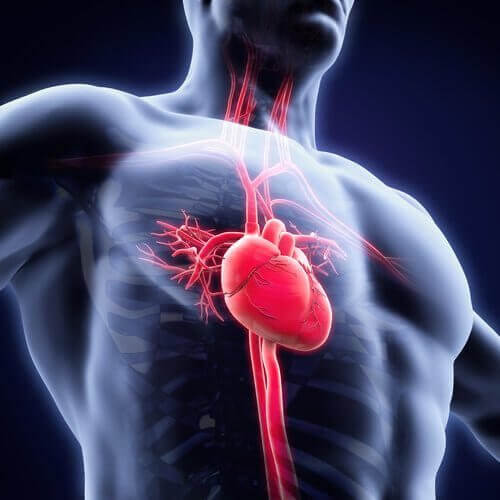Neurocirculatory Asthenia: What You Need to Know

Neurocirculatory asthenia is the medical term for fatigue. It comes from the Greek word, where “a” means without and “sthenos” means force. It’s characterized by a generalized and prolonged weakness. What sets it apart from normal fatigue is that asthenia doesn’t occur after exertion and doesn’t go away with rest.
Thus, it’s characterized by a feeling of lack of energy and motivation, of exhaustion or tiredness. Asthenia can cause memory loss or a decrease in concentration.
It’s also important to note that it isn’t synonymous with drowsiness. Drowsiness and apathy can be a consequence of tiredness after an effort or lack of rest. When fatigue doesn’t go away after getting a good night’s sleep, it should be medically evaluated.
Types of asthenia
In 50% of cases of asthenia, there’s no actual muscle weakness. In other words, it’s a symptom the individual perceives. Therefore, half of the cases are psychogenic or perceived. Underlying depression, anxiety, or a state of chronic stress usually cause this condition. However, the symptoms are very real. They can make life very difficult for a person.
Anyone who suffers from it will have to make a bigger effort to follow their routine. As a result, work, studies, and household chores get complicated. In the end, their motivation decreases considerably.
When the asthenia is organic, it can be the symptom of numerous pathologies. Its causes may be, among others:
- Firstly, cardiovascular causes. In this article, we’ll focus on them.
- Infections. Any infection, such as hepatitis or tuberculosis, can cause it.
- Neurological causes. Such as Parkinson’s disease or myopathies.
- Cancer. Both malignant tumors and their treatment (chemotherapy and radiotherapy) can cause asthenia.
- Endocrine or metabolic disorders. Hypothyroidism, diabetes, malnutrition, etc.
- Hematological causes. It’s common in people with anemia or leukemia.
- Finally, the intake of toxins can also lead to it. Alcohol consumption, and even some medications, usually cause asthenia.
This article may interest you: Consequences of an Imbalanced Diet: Foods that Lead to Tiredness
Neurocirculatory asthenia

It’s hard for these people to make any kind of effort. It can even be a simple task, like walking. In these cases, they experience a burning sensation. The affected part isn’t able to contract. Furthermore, high blood pressure or a cerebrovascular disorder can also cause neurocirculatory asthenia.
In the case of heart failure (or insufficiency), it’s important for the patient to remain active. Thus, even though it’s complicated, the patient must do physical exercise. Experts recommend walking, swimming, and even cycling. If the symptoms worsen during exercise, the person can simply stop. However, once recovered, they must continue with the activity.
In fact, nowadays, you can find Cardiac Rehabilitation Units. They help patients with heart failure (or insufficiency) to progressively make greater efforts. Thus, they seek to maintain the patient’s physical fitness and health.
You may like this article: 6 Things That Are Causing You to Feel Chronic Fatigue During the Day
Neurocirculatory asthenia
This is a specific type of asthenia. In fact, it’s a psychogenic disease in which cardiovascular symptoms predominate. It usually appears in women and people who are under a lot of stress. As a result, an autonomic nervous system imbalance occurs. For this reason, palpitations, tachycardia, dyspnea, and vertigo may appear. Precordial pain may also occur.
The origin of neurocirculatory asthenia is psychogenic. Therefore, although the symptoms are predominantly cardiovascular, heart diseases don’t develop. When the stress or anxiety disappears, the symptoms decrease.
Diagnosis
To diagnose asthenia, the most important thing is to see your doctor to get an exhaustive clinical history. Your doctor must know your symptoms and exactly when they occur.

Firstly, it’s best for the doctor to request a blood and urine test. Imaging techniques, such as MRI or ultrasound, can also help. Similarly, medical professionals commonly use electrocardiograms. All of these tests will help find the underlying cause, if it exists.
Conclusion
If you feel continuously tired and weak, you should go see your doctor, as it could be a symptom of a pathology. The doctor will help you rule out possible causes and indicate a treatment that will help you.
All cited sources were thoroughly reviewed by our team to ensure their quality, reliability, currency, and validity. The bibliography of this article was considered reliable and of academic or scientific accuracy.
- Astenia, ¿realmente tienes esta afección? (n.d.). Retrieved May 6, 2019, from https://www.recursosdeautoayuda.com/astenia/
- Astenia crónica. (n.d.). Retrieved May 6, 2019, from https://www.fesemi.org/informacion-pacientes/conozca-mejor-su-enfermedad/astenia-cronica
- Astenia: definición, síntomas, tratamiento y causas. (n.d.). Retrieved May 6, 2019, from https://www.esgentside.com/astenia/astenia-definicion-sintomas-tratamiento-y-causas_art5527.html
- Insuficiencia Cardiaca: ¿qué es la Astenia? Definición – Insuficiencia Cardiaca para Pacientes. (n.d.). Retrieved May 6, 2019, from http://www.insuficiencia-cardiaca.com/insuficiencia-cardiaca/sintomas-insuficiencia-cardiaca/54-sintomas-astenia-cansancio-insuficiencia-cardiaca.html
This text is provided for informational purposes only and does not replace consultation with a professional. If in doubt, consult your specialist.








